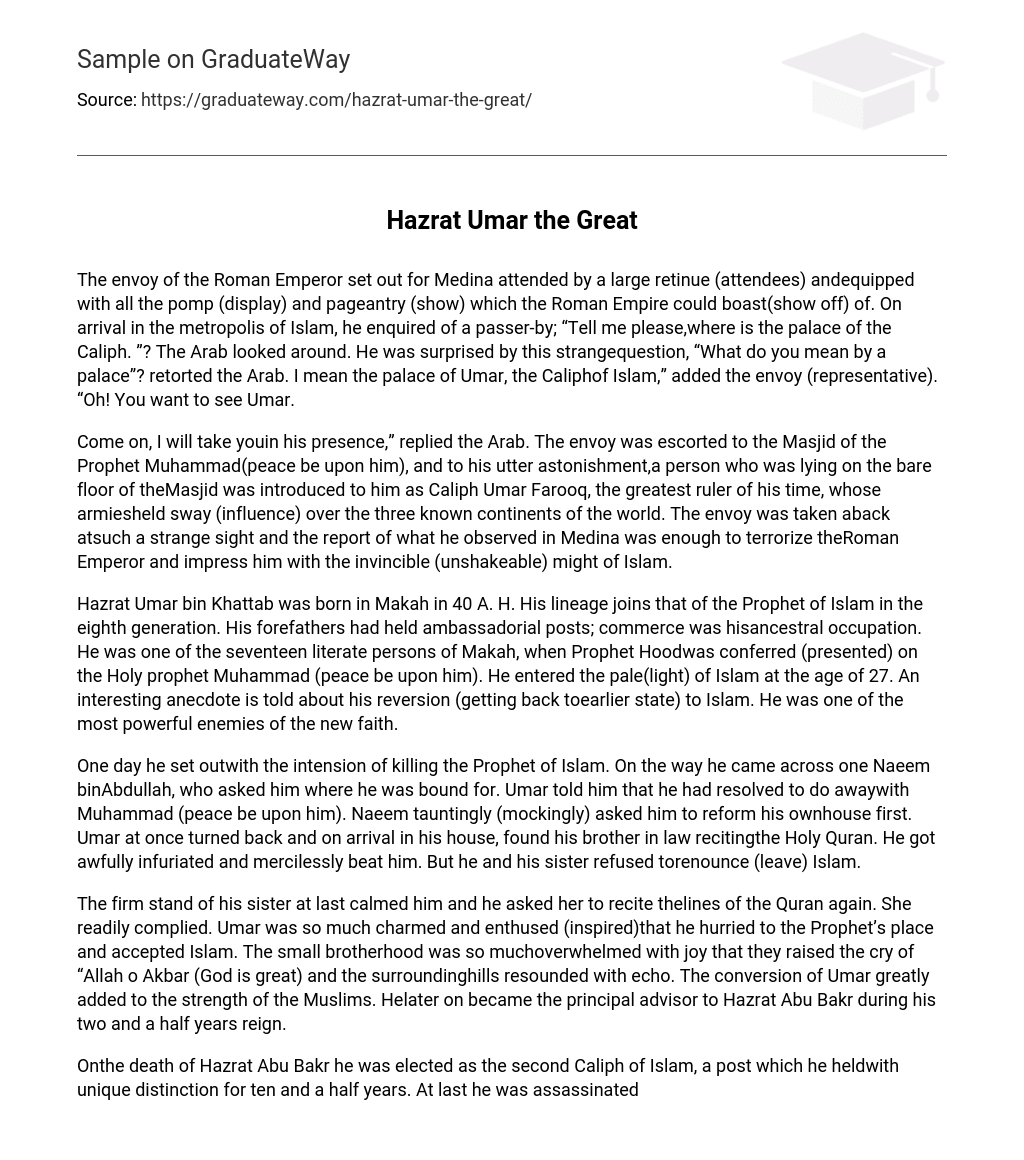The envoy of the Roman Emperor set out for Medina attended by a large retinue (attendees) andequipped with all the pomp (display) and pageantry (show) which the Roman Empire could boast(show off) of. On arrival in the metropolis of Islam, he enquired of a passer-by; “Tell me please,where is the palace of the Caliph. ”? The Arab looked around. He was surprised by this strangequestion, “What do you mean by a palace”? retorted the Arab. I mean the palace of Umar, the Caliphof Islam,” added the envoy (representative). “Oh! You want to see Umar.
Come on, I will take youin his presence,” replied the Arab. The envoy was escorted to the Masjid of the Prophet Muhammad(peace be upon him), and to his utter astonishment,a person who was lying on the bare floor of theMasjid was introduced to him as Caliph Umar Farooq, the greatest ruler of his time, whose armiesheld sway (influence) over the three known continents of the world. The envoy was taken aback atsuch a strange sight and the report of what he observed in Medina was enough to terrorize theRoman Emperor and impress him with the invincible (unshakeable) might of Islam.
Hazrat Umar bin Khattab was born in Makah in 40 A. H. His lineage joins that of the Prophet of Islam in the eighth generation. His forefathers had held ambassadorial posts; commerce was hisancestral occupation. He was one of the seventeen literate persons of Makah, when Prophet Hoodwas conferred (presented) on the Holy prophet Muhammad (peace be upon him). He entered the pale(light) of Islam at the age of 27. An interesting anecdote is told about his reversion (getting back toearlier state) to Islam. He was one of the most powerful enemies of the new faith.
One day he set outwith the intension of killing the Prophet of Islam. On the way he came across one Naeem binAbdullah, who asked him where he was bound for. Umar told him that he had resolved to do awaywith Muhammad (peace be upon him). Naeem tauntingly (mockingly) asked him to reform his ownhouse first. Umar at once turned back and on arrival in his house, found his brother in law recitingthe Holy Quran. He got awfully infuriated and mercilessly beat him. But he and his sister refused torenounce (leave) Islam.
The firm stand of his sister at last calmed him and he asked her to recite thelines of the Quran again. She readily complied. Umar was so much charmed and enthused (inspired)that he hurried to the Prophet’s place and accepted Islam. The small brotherhood was so muchoverwhelmed with joy that they raised the cry of “Allah o Akbar (God is great) and the surroundinghills resounded with echo. The conversion of Umar greatly added to the strength of the Muslims. Helater on became the principal advisor to Hazrat Abu Bakr during his two and a half years reign.
Onthe death of Hazrat Abu Bakr he was elected as the second Caliph of Islam, a post which he heldwith unique distinction for ten and a half years. At last he was assassinated in 644A. D. while leadingthe prayers in the Masjid of the Prophet, by one Feroz alias Abu Lulu, a disgruntled (unhappy)Pharisee. The teachings of the holy Prophet of Islam had transformed the warring (martial) Arab tribesmeninto a united people who brought about the greatest revolution in living history. In less than thirtyyears the nomadic (roaming) Arabs had become masters of the greatest Empire of their time.
Theirarms held sway (lean) over the three known continents of the world and the great Empires of Romeand Persia (Iran) lay tottering before their invincible arms. The Prophet had left behind a band of selfless people who dedicated themselves with single-ness of purpose to the service of the newreligion. One of these persons was Hazrat Umar Farooq who was great both in war and peace. Fewpersons in the history of mankind have displayed better qualities of head and heart than Umar inguiding their armies on the war front, in the discharge of their duties to their people and in adherenceto justice.
He gave detailed instructions to his armies fighting thousands of miles away and it was, to 2a great extent, due to his faultless judgment in the selection of the commanders and the tactics of warthat Arab armies inflicted (imposed) such crushing defeats on their two powerful enemies. Hismaster mind was visible not only in planning easy victories but also in the consolidation (uniting) of conquered countries. Islam has been charged with having been spread at the point of sword, but now it has beenestablished through modern historical researches that Muslims waged defensive wars duringcaliphate Rashida.
Sir William Muir, an English historian, records in his celebrated book, “Rise,Decline and Fall of the Caliphate, “ that after the conquest of Mesopotamia, Zaid, a certain General,sought the permission of Hazrat Umar to pursue the fleeing (escaping) Persian forces into Khorasan,but the Caliph forbade him saying,“I desire that between Mesopotamia and the countries beyond,the hills shall be a barrier so that the Persians shall not be able to get at us, nor we at them.
The plainof Iraq is sufficient for our wants. I would rather prefer the safety of the people than thousands of spoils and further conquests. ”Commenting on the above Muir observes, “The thought of a worldwide mission was yet in embryo; obligation to enforce Islam by universal crusade had not yetdawned upon Muslim mind.





